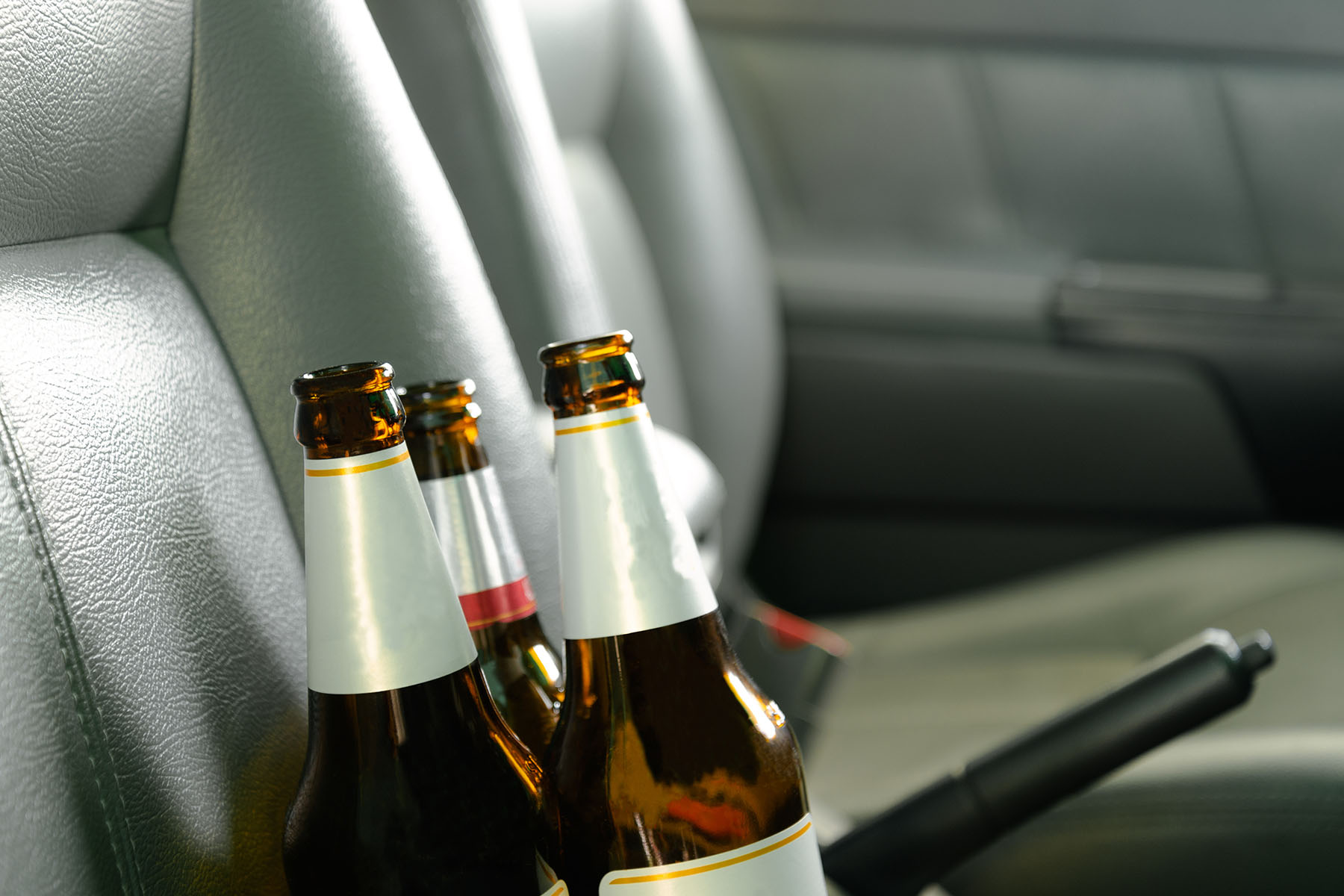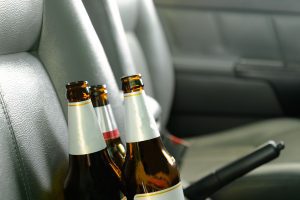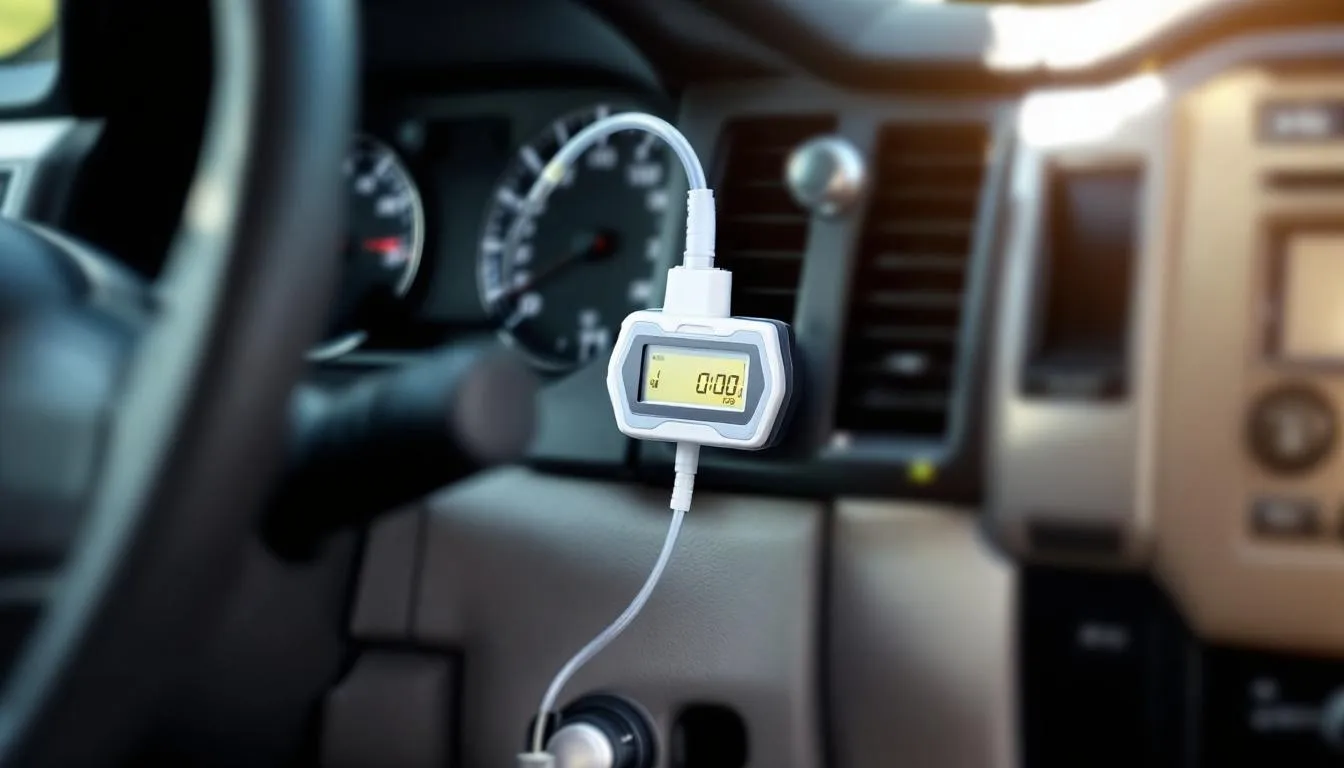
Before we look at potential open container enhancements to DWI charges, let’s review the basic open container laws in Texas.
Per Texas law, it’s illegal to knowingly possess an open container of alcohol in the passenger area of a motor vehicle while on a public roadway. An open container is defined as any bottle, can, or other receptacle containing any amount of alcoholic beverage that is open, has been opened, or has a broken seal.
The law applies regardless of whether the vehicle is in motion or parked, and whether you’re the driver or a passenger. The only exceptions to this law are for passengers in vehicles designed for the transportation of people for compensation (e.g., taxis, limousines) and in the living quarters of motor homes.
Introduction to Open Container Laws
Open container laws are designed to make our roads safer by prohibiting the presence of open containers of alcohol in any motor vehicle, whether the driver is actually impaired or not. These laws target the risk that comes with drinking alcohol while driving or even having alcohol easily accessible in the vehicle. For instance, in Maryland and many other states, it is illegal for drivers or passengers to have an open container of alcohol in the passenger area of a vehicle. Breaking this law can result in being charged with a crime, facing fines, and even jail time, depending on the circumstances.
The penalties for violating open container laws can be significant. Drivers may be subject to fines, points on their driver’s license, and in some cases, suspension of driving privileges. Jail time is also a possibility, especially if the open container violation is combined with other offenses like impaired driving. Commercial driver’s license holders face even stricter consequences, as a violation can impact their ability to work and result in additional penalties. These laws are in place to reduce the risk of impaired driving and to send a clear message: alcohol and driving do not mix, and the presence of an open container in a vehicle is illegal, regardless of whether the driver is actually impaired at the time.
A Complication to Your DWI Case

DRAMATIZATION
If you’re arrested for Driving While Intoxicated and an open container is found in your vehicle, you’ll face additional penalties and more severe criminal charges.
While the presence of an open container alone does not prove that you were intoxicated, it will have a significant impact on your case. The court will consider the presence of an open container when determining penalties and outcomes.
Increased Fines and Penalties
When an open container is discovered in connection with a DWI charge, additional penalties and fines may apply.
In Texas, a first-time DWI offense carries a fine of up to $2,000. Additionally, you may face an additional Class C misdemeanor charge for each open container violation, which carries a fine of up to $500.
Furthermore, when it’s time to renew your Texas Driver License you’ll be hit with renewal surcharges which reach into the thousands of dollars. The surcharge for a 1st DWI is $3,000.00 and these surcharges increase with each subsequent offense—if there’s another offense within 36 months it jumps to $4,500.00. If you take part in a sobriety test and you’re shown to have a BAC of over 0.15%, the surcharge increases to $6,000.00.
Again, that’s if you’re convicted. With the right legal representation, that whole situation can be avoided at best, or deeply mitigated at worst.
Impact on Penalties & Jail Sentencing
If you’re convicted or enter a guilty plea, the open container enhancement may influence sentencing. Sentencing can be affected by the presence of an open container. The presence of an open container could be viewed as an aggravating factor. If this occurs, it could mean harsher penalties like longer license suspension, increased jail time, or both.
The circumstances of your case and any previous criminal history on your part will influence sentencing. For example, license suspension can last up to two years, and jail time may also be measured in years for repeat offenders. However, first-time offenders will likely get credit for time served. Individuals with previous DWI convictions will face more severe penalties.
At the Law Offices of Tad Nelson & Associates, we have numerous strategies for keeping our clients out jail and getting these kind of cases dismissed. We may have options for deferred adjudication, community services, and other remedies to help you find middle ground. The information being shared on this page is for informational purposes and may not apply to your specific situation.
Defense Strategies: Open Container Enhancements
As a Texas Board Certified criminal defense lawyer, Tad Nelson understands the challenges that criminal charges can bring into your life. We’re here to help.
Part of our strategy for fighting these charges is to examine the circumstances surrounding the discovery of the open container. Once we’ve reviewed the details, we can determine the best strategy to counter its impact on your case.
Let’s review a couple of these strategies.
Challenging the Legality of the Search
One strategy to fight this charge is to challenge the legality of the search that led to the discovery of the open container. If the search was conducted without a warrant or probable cause, any evidence, including the open container, may be inadmissible.
If we’re successful with our challenge, the prosecution’s case will be weaker and might result in your case being dismissed.
Establishing Lack of Knowledge or Control
If we can show that you didn’t know about the open container’s presence or had control over it, this will help our defense.
For example, if the open container belonged to a passenger and wasn’t in your immediate vicinity, we could argue that you didn’t knowingly possess the open container. Successfully establishing a lack of knowledge or control might mitigate the impact of the enhancement on your case. Courts are usually reasonable in this regard.
Tad Nelson: Experienced Defense Attorney
Personalized Defense Strategies
Each person and case is different. There’s no one-size-fits-all approach that works for everyone. Our approach to fighting criminal charges is tailored to each person’s unique circumstances. Our priority is to review the details of your case, look for potential weaknesses in the prosecution’s evidence, and forge a strategy to counter the open container enhancement.
Protecting Your Future
A DWI conviction, especially with an open container enhancement, can have a lasting impact on your life. It could affect everything from your employment opportunities to your personal relationships. It can certainly hurt your finances. That’s why it’s important to have a skilled DWI defense lawyer on the case. The value of having an experienced DWI defense lawyer lies in their ability to protect your future and help minimize the long-term consequences of a conviction.
Need Help?
Talk With A Defense Attorney Today!
If you’re facing criminal charges for DWI in Harris County or Galveston County, possession of an open alcoholic container, or any other offense, don’t wait—contact Attorney Tad Nelson today. We have law offices in Houston, Galveston, and League City for your convenience.
We provide 100% free & confidential initial case evaluations and easy payment plans. To get started, call us. We’re at 281-280-0100. Understanding DWI: What You Need to Know
Driving While Intoxicated (DWI) is a serious offense that involves operating a motor vehicle while impaired by alcohol or drugs. The law is designed to protect the safety of all road users by penalizing those who pose a risk due to impaired driving. In Texas, as in many states, a person is considered legally intoxicated when their blood alcohol concentration (BAC) reaches 0.08% or higher. However, impairment can occur even at lower BAC levels, and the law prohibits driving under the influence of any substance that affects your ability to operate a vehicle safely.
The Risks and Consequences of Driving Impaired
Driving impaired significantly increases the risk of accidents, injuries, and fatalities. Texas law penalizes anyone who drives a vehicle while impaired. Alcohol and drugs, including marijuana and prescription medications, can impair judgment, reaction times, and motor skills. This combination of factors can lead to dangerous situations on the road, putting not only the impaired driver but also passengers, pedestrians, and other drivers at risk.
When a driver is arrested for DWI, the consequences can be severe. This offense is called driving while intoxicated (DWI) and is distinct from other offenses like DUI. If a driver takes a BAC test after being stopped, the results can significantly impact the penalties imposed. Penalties often include hefty fines, jail time, license suspension, and mandatory participation in alcohol education or treatment programs. Repeat offenses typically result in harsher penalties, including longer jail sentences and extended license suspensions.
The Role of Traffic Stops and BAC Testing
Law enforcement officers play a critical role in identifying and stopping impaired drivers. During a traffic stop, if an officer suspects that a driver is impaired, they may administer field sobriety tests or request a breathalyzer test to measure BAC. If the driver refuses to take the test, this can result in automatic license suspension and additional penalties.
The results of BAC tests are crucial evidence in DWI cases. A BAC of 0.08% or higher is considered per se evidence of impairment under Texas law. However, even if a driver’s BAC is below this threshold, they can still be charged with DWI if their ability to drive is visibly impaired by drugs or alcohol.
Commercial Driver’s License Holders and DWI
Drivers holding a commercial driver’s license (CDL) face stricter regulations regarding impaired driving. The allowable BAC limit for CDL holders is typically lower than for regular drivers, often set at 0.04%. Violations can lead to disqualification from driving commercial vehicles, impacting employment and livelihood.
Child Endangerment and DWI
One of the most serious enhancements to DWI charges involves child endangerment. If a driver is found operating a vehicle while impaired and transporting children under a certain age, they may face increased fines, longer jail sentences, and additional legal consequences. Courts view driving impaired with children in the vehicle as a grave offense, reflecting the heightened risk to vulnerable passengers.
The Impact of Open Container Laws on DWI Charges
As previously discussed, possessing an open container of alcohol in a vehicle can complicate DWI cases. The presence of an open container suggests consumption of alcohol while driving or prior to driving, which can be used to strengthen the prosecution’s case. This may result in additional charges or enhancements, leading to increased fines and penalties.
Public Awareness and Prevention
Public awareness and prevention efforts are essential in reducing the number of impaired driving offenses and making our roads safer for everyone. Educational campaigns, community outreach, and school programs all play a role in informing drivers about the dangers and penalties associated with impaired driving. These initiatives highlight the risks involved, such as increased chances of accidents, injury, and even death, as well as the legal consequences like fines, license suspension, and jail time.
Modern technologies are also making a difference in the fight against impaired driving. For example, ignition interlock devices require drivers to pass a breath alcohol test before the vehicle will start, helping to prevent those under the influence from getting behind the wheel. These systems, along with ongoing public education, help to reduce the number of offenses and encourage responsible behavior. By raising awareness and using technology to enforce the law, communities can lower the risk of impaired driving and create a safer environment for all drivers and passengers.
Defending Against DWI Charges
Defending a DWI charge requires a thorough understanding of the laws and procedures involved. Experienced defense attorneys examine the details of the traffic stop, the legality of the search, the accuracy of BAC tests, and the circumstances surrounding the arrest. Strategies may include challenging the officer’s probable cause for the stop, questioning the administration and calibration of breathalyzer devices, or demonstrating that the driver’s impairment was due to legal medications rather than alcohol or illegal drugs. The outcome of a DWI case can also depend on the opinions of the judge or jury regarding the evidence and circumstances presented.
Emerging Technologies in DWI Enforcement
Law enforcement agencies are increasingly using advanced technologies to detect and prevent impaired driving. These include ignition interlock devices, which require the driver to pass a breathalyzer test before starting the vehicle. Ignition interlock devices do not record sound, but may take photographs to verify the identity of the person providing the breath sample. Other examples of technologies used in DWI enforcement include in-car cameras that record the driver’s actions during a traffic stop and remote alcohol monitoring systems. These technologies aim to reduce the incidence of impaired driving and enhance public safety.
The Importance of Legal Representation
Facing a DWI charge can be overwhelming, with serious implications for your personal and professional life. A DWI conviction can affect many areas of your life, including employment, finances, and personal relationships. Other areas, such as your reputation and future opportunities, may also be impacted by a DWI conviction. Having skilled legal representation is crucial to navigate the complexities of the legal system and protect your rights. A knowledgeable attorney can help reduce penalties, explore alternatives such as deferred adjudication, and work towards the best possible outcome for your case.

Ignition interlock devices are an effective technology used to prevent impaired driving by requiring a breath test before vehicle operation.
If you or someone you know is facing DWI charges, including those complicated by open container violations, don’t hesitate to seek professional legal advice. Early intervention can make a significant difference in the outcome of your case and help safeguard your future.

